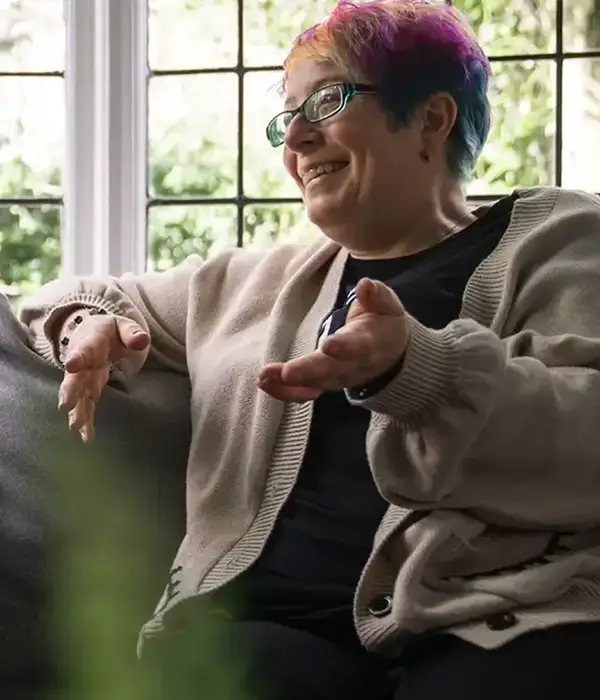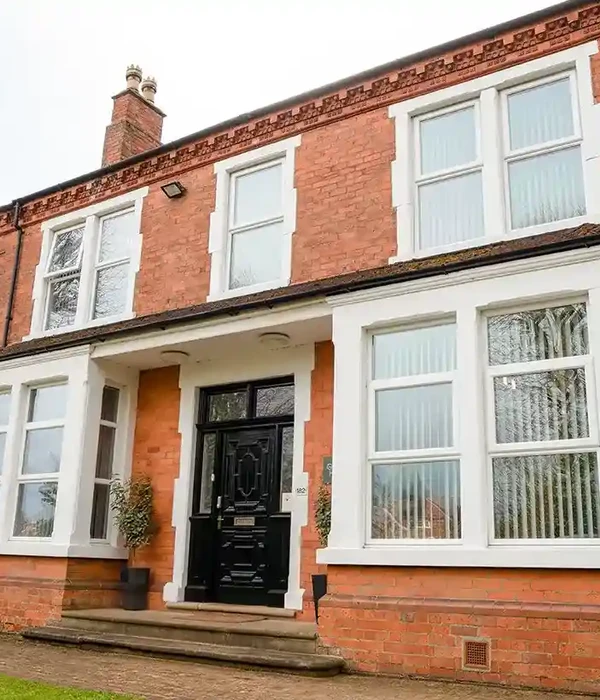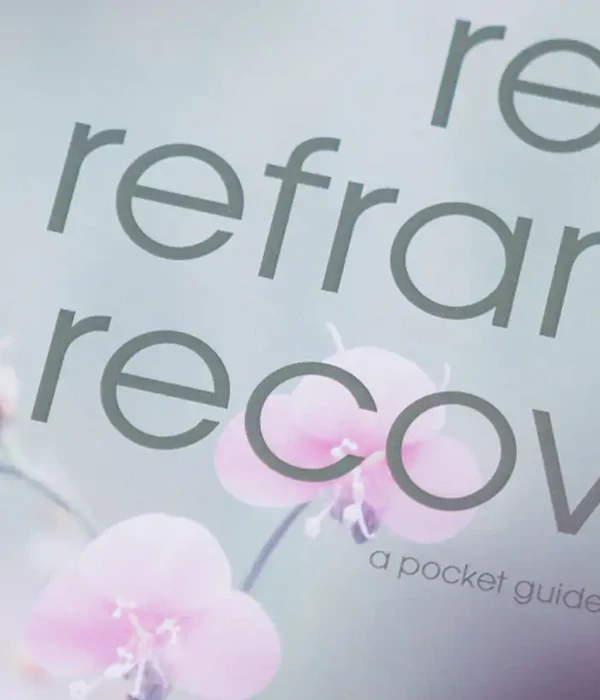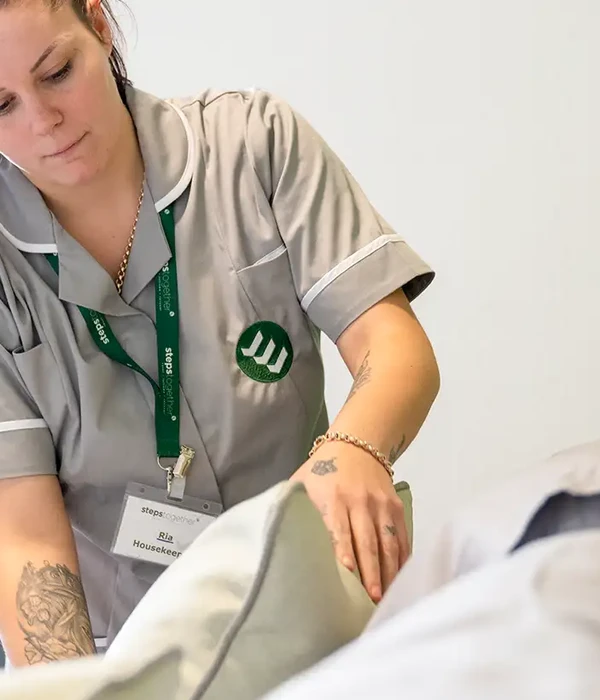Gambling Addiction Treatment
Many people struggle with gambling and find it hard to stop on their own. Effective treatment for gambling addiction is available, and it can help you regain control over your habits.
You might feel overwhelmed or embarrassed, but there are several therapies and support groups designed to guide problem gamblers through recovery. Seeking gambling addiction treatment is a practical step towards a healthier and more balanced life. With the right support and commitment, you can break free from the grip of gambling addiction.

Take the First Step Towards Recovery
Steps Together offers personalised support and proven treatments, providing the care, guidance and encouragement you need to move forward with confidence and build a healthier future.

Understanding Gambling Addiction
Gambling addiction, also called gambling disorder or compulsive gambling, happens when you feel unable to control your gambling behaviour even if it causes you harm. This addiction is not just wagering every now and again, but is marked by a loss of control over behaviour.
This condition can lead to mental health problems, financial difficulties, and damaged relationships if not addressed early. Some people may even find themselves in legal trouble as they seek out ways to continue funding their addiction.
Signs and Risk Factors
Recognising the signs and symptoms of gambling addiction is important for getting help. Some common symptoms include needing to gamble with more money to feel excitement, restlessness or irritability when trying to stop, lying to hide gambling behaviour, chasing losses by gambling more, and jeopardising work or relationships because of gambling.
Certain factors can make you more likely to develop a gambling problem. Major risk factors include a family history of addiction or mental health issues, early exposure to gambling, high stress levels or life changes, easy access to gambling activities, and co-occurring conditions such as depression or anxiety.


Effects on Mental Health and Relationships
Gambling addiction can seriously affect your mental health and personal life. Many people experience anxiety, low mood, and even mental health disorders because of their gambling behaviour. Stress from financial problems can exacerbate these issues.
Financial difficulties caused by gambling may result in debt, strained relationships, or even legal trouble. Family members, especially spouses and children, may feel betrayed as savings and funds are diverted to gambling activities instead.
Gambling Addiction Treatment Options
Treatment for gambling addiction can combine talking therapies, medication, and lifestyle changes. Support often focuses on managing urges, changing unhelpful thoughts, and building healthier habits.
Cognitive Behavioural Therapy (CBT)
Cognitive behavioural therapy (CBT) is one of the most widely used treatments for gambling addiction. With CBT, you explore the thoughts, feelings, and beliefs that drive your gambling behaviour. By working with a therapist, you learn how to challenge and change negative patterns of thinking.
CBT helps you recognise triggers that make you want to gamble. You also build practical skills to manage stress and strong urges. Sessions can involve setting clear goals, keeping a diary of gambling urges, and practising new coping strategies.
Medication-Assisted Treatment
Medication is sometimes offered in a treatment programme if you have strong or persistent urges to gamble, especially when other treatments alone are not enough. Common medications include antidepressants, mood stabilisers, and opioid antagonists like naltrexone.
Antidepressants can help if you are also dealing with anxiety or depression, and those fuel your gambling. Mood stabilisers may be prescribed when gambling addiction occurs alongside other mental health conditions. Naltrexone works by reducing the pleasure you feel when gambling.
Dialectical Behaviour Therapy (DBT)
Dialectical behaviour therapy (DBT) is a form of talking therapy that builds on some core ideas of CBT, but it also places special emphasis on accepting strong feelings. DBT may be helpful for you if you struggle with intense emotions and find it difficult to control impulses.
A therapist guides you through mindfulness practices and teaches skills for dealing with distress without resorting to gambling. DBT sessions help you improve emotional regulation and develop healthier coping mechanisms.
Mindfulness and Meditation
Mindfulness and meditation are useful tools to help you stop gambling and become self-aware. Practising mindfulness means paying close attention to your thoughts, feelings, and urges without judgment.
Techniques such as deep breathing, body scans, and guided meditation can help reduce stress and increase control over impulses. Many people find it easier to resist the urge to gamble when they regularly employ these strategies.
Services that our multi-speciality addiction rehabilitation centres offer
Love and Relationship Addiction Treatment
Love and Relationship Addiction Treatment

Treatment Programmes for Compulsive Gamblers
Different types of treatment plans offer specific structures and support systems. Choosing the right option can affect your recovery and ongoing well-being. Residential treatment, also called residential rehab, means you stay at a dedicated facility for a set time. This setting provides a highly structured and immersive environment.
Outpatient treatment allows you to live at home while attending scheduled therapy and counselling sessions at a clinic or centre. This option is often suitable for people with mild to moderate gambling addiction who still have stable support at home.
Support Groups
Joining Gamblers Anonymous (GA) connects you with people who understand the struggles of gambling addiction. These support groups offer a safe space for individuals to share their experiences, discuss openly, and hold one another accountable through regular meetings. GA follows a 12-step programme, focusing on personal responsibility and mutual support.
Support groups offer more than just social contact. They help you recognise triggers, celebrate successes, and learn new ways to cope. You can attend meetings in person or online, making it easier to find help that fits your schedule.

Diagnosis and Assessment
A formal diagnosis of gambling disorder often begins with a clinical interview. Mental health professionals use structured conversations to explore the person’s gambling habits, triggers, and patterns of behaviour. Screening tools such as the DSM-5 criteria for gambling disorder or the South Oaks Gambling Screen (SOGS) help standardise the process. These tools make it easier to distinguish between occasional risky behaviour and a diagnosable condition that requires treatment.
Gambling disorder rarely exists in isolation. Many people struggling with gambling also face depression, anxiety, substance use disorders, or other mental health concerns. During assessment, clinicians look carefully for these co-occurring issues, since they can intensify gambling behaviour and complicate recovery. Addressing both the gambling problem and any related conditions at the same time leads to more effective treatment outcomes.
An essential part of assessment involves understanding how gambling affects day-to-day living. Clinicians examine the financial consequences, such as mounting debt or borrowing money, alongside social and relational effects, like conflict with family or neglect of responsibilities. They also consider occupational and academic performance. This step helps determine the severity of the disorder and guides the level of care needed, whether outpatient therapy or a more intensive programme.
Ongoing Support for Gambling Addiction
Building a strong support network is key in gambling addiction treatment. Connecting with others, establishing healthy routines, and learning effective ways to manage urges can significantly impact long-term recovery.
Family Therapy and Social Support
Your family and friends play a role in gambling addiction treatment. Family therapy involves working with a trained therapist to address relationship issues, improve communication, and rebuild trust. It can help your loved ones understand gambling addiction and how to respond constructively.
When you involve those close to you, you’re less likely to feel isolated. Social support can include practical help, emotional encouragement, and help setting boundaries. Family and friends can also learn to spot warning signs, which helps in preventing relapse.
Relapse Prevention Techniques
Preventing relapse means having a clear plan in place for handling challenging moments. Many treatment clinics offer Cognitive Behavioural Therapy (CBT), which teaches you how to recognise risky situations and reshape unhealthy thought patterns. It’s useful to identify high-risk times and make a plan for what you’ll do or whom you’ll call if you’re struggling.
Setting up regular check-ins with a support network, mentor, or therapist keeps you accountable. Relapse prevention also focuses on tracking your progress and rewarding healthy behaviours, like attending meetings or reaching goals.
Coping Strategies and Mechanisms
Developing coping strategies is essential for managing urges and stress. Common techniques include avoiding triggers, such as staying away from betting shops or gambling websites. It helps to keep a list of reasons for staying gamble-free, as a reminder when temptation strikes.
Basic stress management, like deep breathing, regular exercise, and mindfulness, can also help reduce gambling cravings. Finding new hobbies or activities lets you healthily fill your free time. Some people benefit from establishing financial controls, such as limiting access to funds or utilising self-exclusion schemes.

You Can Break the Cycle of Gambling
Being addicted to gambling can have devastating consequences on your life. But professional gambling addiction treatment can help you or your loved one break the cycle of addiction and build a life free from gambling issues.
At Steps Together, we’re ready to help you break the cycle of gambling. We’re ready to help you end your compulsive behaviour. Your compulsions do not have to control you, and with help, you can learn how to control them.
Frequently Asked Questions
What are effective therapies for gambling addiction?
Cognitive Behavioural Therapy is widely used for treating gambling addiction. CBT teaches you how to manage gambling urges and change harmful patterns of behaviour. Other approaches include individual counselling and talking therapies that focus on understanding why you gamble and how to stop.
Is medication an option for treating gambling addiction?
Medication is not the main treatment for gambling addiction. However, in some cases, doctors may prescribe medicine to manage symptoms like anxiety, depression, or obsessive thoughts that can come with gambling problems.
How can families assist a member dealing with a gambling addiction?
Family support can be crucial. You can help by learning about gambling addiction, recognising warning signs, and offering encouragement rather than judgement. Counselling and education are available for families.
Where can one find professional support for overcoming a gambling problem?
Support is available from the NHS, mental health clinics, and specialist addiction treatment centres. You can access free and confidential advice through services like the NHS. Rehabilitation clinics and private counsellors also provide structured help, often as part of wider mental health treatment. Some organisations offer helplines, online chats, or in-person sessions for extra support.
What role do support groups play in the recovery from compulsive gambling?
Support groups provide a platform for you to share experiences with others who are facing similar struggles. Being part of a group can reduce feelings of isolation and help motivate you to stay on track. Structured group therapy can also offer professional guidance while creating a supportive community for recovery.
What strategies exist for preventing relapse in gambling addiction?
Relapse prevention often includes avoiding risky situations, recognising personal triggers, and building new, healthy habits. Regular check-ins with a counsellor or support group can make a difference. Setting barriers, such as self-exclusion from gambling venues, and learning coping skills through therapy also help reduce the risk of relapse.





